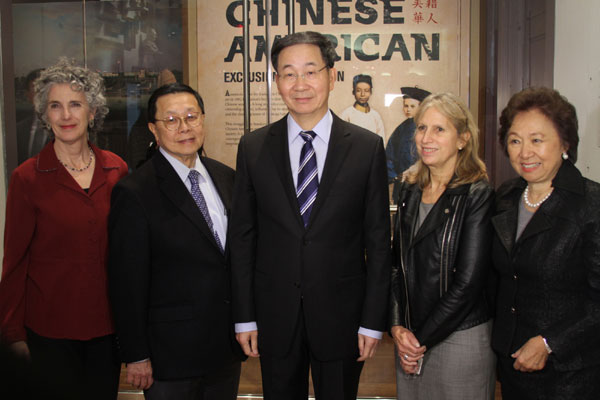 |
|
Sun Guoxiang (center), consul general of the Chinese Consulate General in New York, with members of the New York Historical Society and the Committee of 100 after Sun was given a tour of the museum's new "Chinese American: Exclusion/Inclusion" exhibit. From left: Marci Reaven, vice-president of historical exhibitions at the New York Historical Society, as well as the curator of the exhibit; Henry Tang, co-founder of the Committee of 100; Sun; Louise Mirrer, president and CEO of the New York Historical Society; Shirley Young, president of Shirley Young Associates. Amy He/China Daily. |
The exhibit,which opened on Sept 26, focuses on the experience of Chinese immigrants, and documents their integration into mainstream American society through more than 200 pieces of artwork, photographs and other historical documents.
"I'm learning in awe the past stories of Chinese Americans. We may have known about the history of Chinese immigration through smaller, individual stories, but this exhibit gives us a chance to learn a more complete one, so it's a rare opportunity," said Sun after viewing the exhibit at the Historical Society on Central Park West and 77th Street.
"After seeing the exhibit, there were two things that stood out to me. First is the resilience of the Chinese people, because they immigrated to the US a hundred years ago and their lifestyles and their work conditions then were extremely arduous. But they showed resilience in the biggest sense of the word. No matter what profession it was, they started from scratch and step by step, developed their lives," he said.
Second, he said, was that no matter where Chinese go, they always bring with them their culture to their new land.
Sun said that he has great respect for the difficult lives that the early Chinese immigrants led when they came to the US, but despite that they were able to bring over generations of Chinese culture.
Louise Mirrer, president and CEO of the Historical Society, said in remarks after the tour that the society is "thankful for the opportunity to be able to tell the long and exceedingly important history of Chinese in America".
"Chinese have come here over centuries; they have left an impact and an imprint. They brought really important change and progress for this country in every respect and everywhere that they've been. They built this nation. They connected our East and West coasts and for us to be able to tell this story has been a wonderful, wonderful occasion and opportunity," Mirrer said.
Marci Reaven, vice-president for historical exhibitions and curator for the Exclusion/Inclusion exhibit, told China Daily in June that the museum wanted to spotlight Chinese immigrants' exclusion in the US as it relates to their citizenship and immigration status and how that changes what it means to be an American in the US.
"That's one of the key questions that get asked: in what way does the story help us know what has made an American and what makes an American?" she said.
Reaven said that finding items and putting them together in the exhibit took about two years and wasdifficult at times because this period of American history was not well-documented. Chinese immigrants did not have a lot of leisure time and their lives were not as stable, producing less opportunity for them to write letters to each other, produce art, and keep track of their own histories, she said.
"There are fewer collections of Chinese-American ephemera that went down through families, probably because families weren't being set up as much so as other cultures. At first, it was because of the cultural preferences about women not traveling, but then secondly because they were prevented to do so by law,"said Reaven.
"I think it could often be women who could be holders of family lore and things like that, so if families aren't being set up, you're probably not going to have the same kinds of collecting going on if people are not able to set up more stable households," she added.
Chinese American: Exclusion/Inclusion will run through April 19 before traveling to other cities, including Portland, Oregon and San Francisco.
amyhe@chinadailyusa.com
